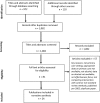The impact of brief alcohol interventions in primary healthcare: a systematic review of reviews
- PMID: 24232177
- PMCID: PMC3865817
- DOI: 10.1093/alcalc/agt170
The impact of brief alcohol interventions in primary healthcare: a systematic review of reviews
Abstract
Aims: The aim of the study was to assess the cumulative evidence on the effectiveness of brief alcohol interventions in primary healthcare in order to highlight key knowledge gaps for further research.
Methods: An overview of systematic reviews and meta-analyses of the effectiveness of brief alcohol intervention in primary healthcare published between 2002 and 2012.
Findings: Twenty-four systematic reviews met the eligibility criteria (covering a total of 56 randomized controlled trials reported across 80 papers). Across the included studies, it was consistently reported that brief intervention was effective for addressing hazardous and harmful drinking in primary healthcare, particularly in middle-aged, male drinkers. Evidence gaps included: brief intervention effectiveness in key groups (women, older and younger drinkers, minority ethnic groups, dependent/co-morbid drinkers and those living in transitional and developing countries); and the optimum brief intervention length and frequency to maintain longer-term effectiveness.
Conclusion: This overview highlights the large volume of primarily positive evidence supporting brief alcohol intervention effects as well as some unanswered questions with regards to the effectiveness of brief alcohol intervention across different cultural settings and in specific population groups, and in respect of the optimum content of brief interventions that might benefit from further research.
Figures
References
-
- Aalto M, Pekuri P, Seppa K. Obstacles to carrying out brief intervention for heavy drinkers in primary health care: a focus group study. Drug Alcohol Rev. 2003;22:169–73. doi:10.1080/09595230100100606. - DOI - PubMed
-
- Aira M, Kauhanen J, Larivaara P, et al. Factors influencing inquiry about patients’ alcohol consumption by primary health care physicians: qualitative semi-structured interview study. Fam Pract. 2003;20:270–5. doi:10.1093/fampra/cmg307. - DOI - PubMed
-
- Alonso J, Angermeyer M, Bernert S, et al. ESEMeD/MHEDEA 2000 Investigators. Use of mental health services in Europe: results from the European study of the Epidemiology of Mental Disorders (ESMeD) project. Acta Psychiatr Scand. 2004;109:47–54. doi:10.1111/j.1600-0047.2004.00325.x. - DOI - PubMed
-
- Anderson P. Managing alcohol problems in general practice. Br Med J. 1985;290:1873–5. doi:10.1136/bmj.290.6485.1873. - DOI - PMC - PubMed
-
- Anderson P, Laurant M, Kaner E, et al. Engaging general practitioners in the management of hazardous and harmful alcohol consumption: results of a meta-analysis. J Stud Alcohol. 2004;65:191–9. - PubMed
Publication types
MeSH terms
Grants and funding
LinkOut - more resources
Full Text Sources
Other Literature Sources
Medical
Molecular Biology Databases
Miscellaneous


